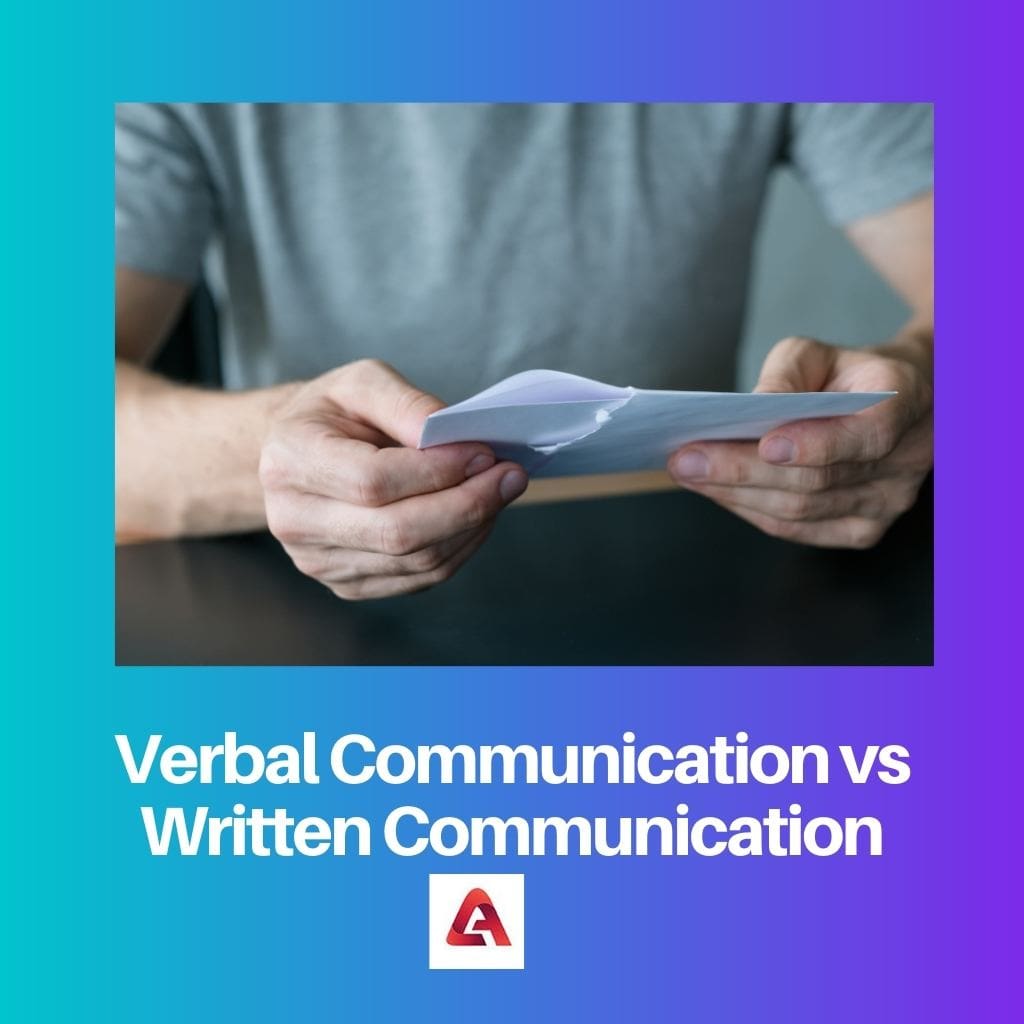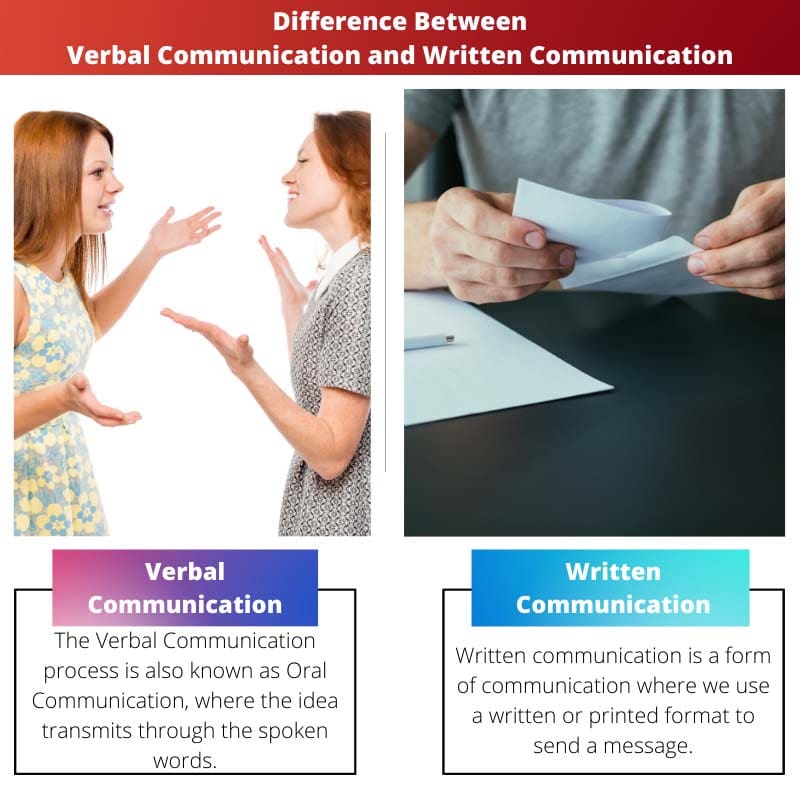Communication is the process of exchanging feelings, information, ideas, messages, and opinions with or without words. Effective interaction is one of the essential life skills.
Communication is extremely crucial to produce better perception. Communication occurs when one person interacts with another person or more than one person.
In the process of communicating, two persons are necessary. Verbal Communication and Written Communication are essential for exchanging thoughts and ideas.
Key Takeaways
- Verbal communication involves using spoken language to convey a message, while written communication involves using written language.
- Verbal communication is more immediate and allows for real-time feedback, while written communication can be more precise and permanent.
- Written communication can be shared with a wider audience and is used for formal or official communication, while verbal communication is used for informal or interpersonal communication.
Verbal Communication vs Written Communication
Verbal communication refers to using spoken or written words to convey a message from one person to another and involves using language to share thoughts and information. Written communication refers to exchanging information, ideas, or messages through written words, symbols, or signs.

Spoken words, sounds, face-to-face talk, speech, seminars, group discussions, phone call conversations, conferences, and interviews are examples of Verbal Communication. In this case, one can convey the message clearly and get immediate feedback.
The mediums of Written Communication are letters, messages, notes, emails, and many other ways. Written Communication is the most reliable process to convey a message.
Comparison Table
| Parameters of Comparison | Verbal Communication | Written Communication |
|---|---|---|
| Meaning | The Verbal Communication process is called Oral Communication, where the idea transmits through spoken words. | Written communication is a form of communication where we use a written or printed format to send a message. |
| Type of Communication | Both formal and informal. | Formal. |
| Medium of Communication | Spoken language, sound, words, face-to-face talk, speech, seminar, group discussion, phone call conversation, conference, interview, radio, etc. | Letters, messages, notes, emails, telegram, newspapers, journals, magazines, office memos, reports, contracts, faxes, etc. |
| Literacy | Not required. | Required. |
| Feedback | One can get immediate feedback. | Sometimes feedback takes time. |
| Personal Presence | Required. | Not required. |
| Transmission of Message | Fast | Slow |
| Proof or Record | Sometimes no proof or record of communication is there. | As it is written, proof or record is there. |
| Chance of Misunderstanding | High possibility of misunderstanding. | Low chance of misunderstanding. |
What is Verbal Communication?
In Verbal Communication we use spoken words as the medium of communication.
Spoken language, sound, spoken word, face-to-face talk, speech, phone call conversation, group discussion, conference are examples of Verbal Communication.
The Verbal Communication method is a spontaneous and faster process for communicating. Powerful words are more effective than action.
One can notice someone’s body language, voice tone, expressions during the communication process.
In this process, people talk to each other and communicate by exchanging their feelings, likes, dislikes, views, etc.
Sound is the most strong element in Verbal Communication, as most people have vocal cords that produce sounds.
Good Verbal Communication skills are essential for collaborating and communicating with others. It increases the ability of individuals to share feelings and ideas.
To speak concisely and politely with customers or clients, one needs good Verbal Communication skills.
There are four types of Verbal Communication, Intrapersonal Communication, Interpersonal Communication, Small Group Communication, Public Communication.
Intrapersonal Communication is a form of communication that is very private and confidential. Interpersonal Communication takes place between two persons.
Small-Group Communication takes place within few people. Public Communication develops with so many people through television, social media, live telecast, radio, etc.
Verbal Communication is essential in every aspect of a business. Verbal Communication is suitable for both literate and illiterate people to communicate.

What is Written Communication?
Written Communication develops through sending and receiving a message in written format. We can convey messages through letters, emails, messaging, notes, journals, and many other ways.
It is a very reliable way of communication because we can preserve, carefully drafted, and formal. This mode is preferred in the business and official world. Written Communication is easy to keep.
In this mode, we can convey the message plan fully and very carefully. Very little chance of misinterpretation or wrong delivery of the message as it is organized and words are chosen very carefully.
Written Communication is a lengthy process quick feedback is sometimes not possible. This form of communication is not suitable for illiterate people. It is compatible with literate people.
Written Communication skills are necessary at every stage and essential to get a job. Written Communication relies on grammar, word choice, and punctuation.
The disadvantage of Written Communication is that the sender will never know that the receiver has read the message or not.
A well-written communication helps identify problems and arrive at solutions. In Written Communication, some elements are significant as structure, style, and content.

Main Differences Between Verbal and Written Communication
- Verbal Communication is the process of communicating through spoken words or tone of voice, whereas in Written Communication printed text or typed format of the message is used to communicate.
- Verbal or Oral Communication comparatively faster than Written Communication where one can get immediate feedback.
- In Verbal Communication literacy of the person is not essential. On the other hand, in Written Communication the person must be literate.
- Written Communication is reliable and preserves proper records. On the other hand, Verbal or Oral Communication is proofless.
- In Verbal Communication misinterpretation of the message is possible, whereas in Written Communication there are no possibilities of misinterpretation.
- Verbal Communication is faster than Written Communication.
- Verbal Communication is spontaneous. We can’t erase what we uttered once. On the other hand, in Written Communication we can edit and recheck the message before delivery.



